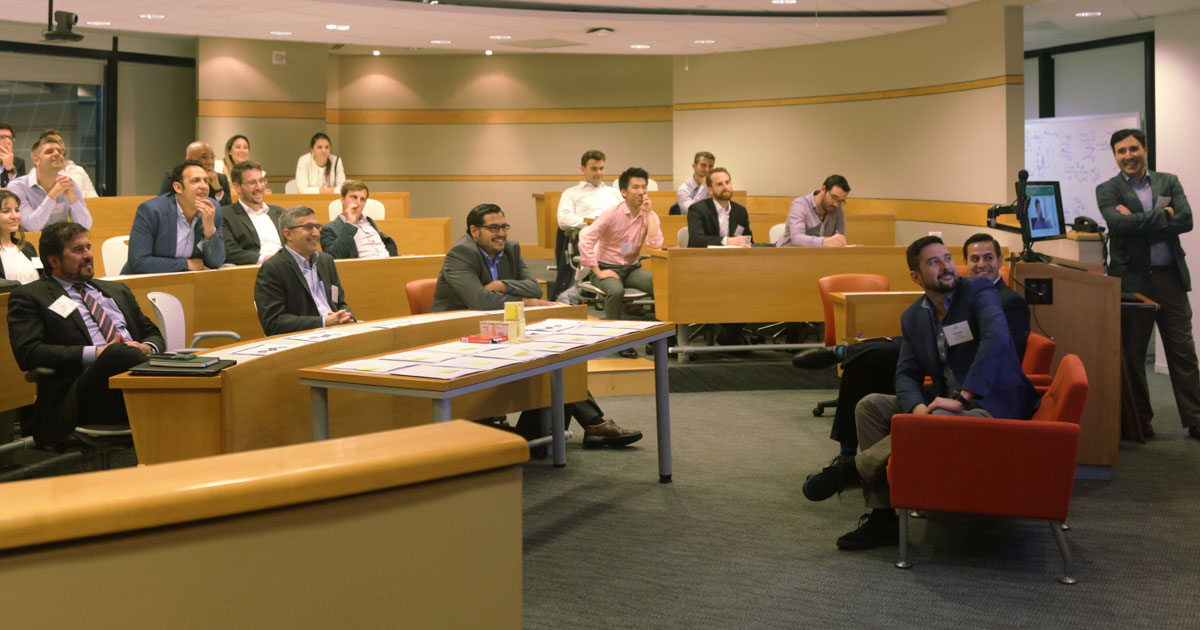Bringing the Boardroom to the Classroom

You made the decision to invest in yourself and get an MBA. But what does that degree look like in the business world? Babson is committed to bringing current CEOs, founders, and executives into the classroom to show the impact your degree will have once you graduate.
Leaders in the Classroom
Babson Miami, in its first year of offering graduate and executive education programs to entrepreneurs of all kinds living and working in South Florida and across Latin America, is bringing the boardroom to the classroom.
“We wanted to duplicate the Babson experience in all of our hub locations,” said Kevin Sullivan, vice president of strategic corporate relations and engagement at Babson. This experience includes bringing top executives to campus.
During the last 18 months, Babson has created strong connections in the corporate and public sectors of Miami. Thanks to these connections, many top CEOs and business leaders have been guest speakers in MBA classes.
“It is always great to have experienced CEOs in the classroom,” said Gustavo Trindade, director of Babson Miami. “The students are learning something practical and are not just hearing about their experiences but are able to ask questions as well.”
Bringing the Case to Life
In many MBA programs, case study learning is used to bring practicality to theories and frameworks. Babson isn’t simply having students read the case; it is bringing the case studies to life in the classroom.
Andy Stuart, president and CEO of Norwegian Cruise Line, came to speak to the MBA students at Babson Miami. He used his years of experience in sales, product design, and marketing to provide sage advice to the students about incumbents, disruptors, and how to stay relevant in a constantly changing market.
“The students were extremely engaged,” said Stuart. “They were a very confident group; they jumped right in and asked great questions.”
This wasn’t your typical lecture. It was a conversation between the students and Stuart. This is an opportunity that most of these students wouldn’t have been able to experience on their own—a chance to ask real-time questions of the CEO of a billion-dollar company.
“You could tell that they were good all-around thinkers,” said Stuart. “For a group that didn’t have a deep understanding of the cruise industry, they asked great questions and could adjust to any industry.”
Stuart was able to impart some industry agnostic wisdom to the students in the classroom.
“Every industry relies on people,” said Stuart. “It doesn’t matter how smart or educated you are; at some point you need to figure out how to truly work with people.”
In his extensive career, he has seen that those who have an adaptable emotional IQ tend to be more successful. He was able to discuss this, and so much more, with the Babson students.
A View of Your Future
Through experiences like speaking with Stuart, and hearing from other business leaders in different fields, MBA students see firsthand where their degree can take them.
“Andy [Stuart] was great to have in class,” said Victoria Crittenden, professor and division chair of marketing at Babson. “He is from a large company based in Miami, and he started at the bottom of the ranks and worked his way up to CEO.”
Because of Stuart’s vast experience, the students were able to see their potential futures in his career path. He was personable and relatable, and honest when answering questions.
“He talked to the students about the way Norwegian Cruise Line uses data 24 hours a day, seven days a week,” said Crittenden. “His company even uses the same program the students are learning, Tableau.” Hearing from Stuart, the students took what they were learning into the classroom and made it tangible to practical business application.
“You can tell he tailored his presentation specifically for our group,” said Crittenden. By doing that, Stuart created a unique experience for the students.
Stuart applauded Babson’s effort to bring industry into the classroom. “One of the reasons I wanted to take this opportunity is because getting perspectives from people who are in the thick of it, and dealing with issues real time, is a big help,” said Stuart. “It is a big enhancement to students.”
Posted in Community



